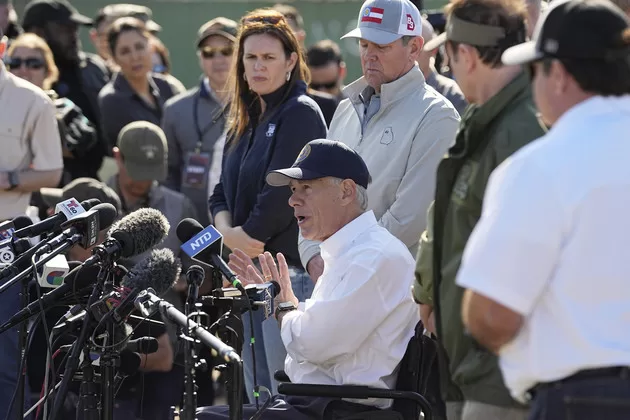The partisan, cross-border swipes during the late January speech may say more about American politics in 2028 than in 2024. Many of the country’s highest-profile state executives — several talked up as likely presidential contenders in four years — are using their agenda-setting annual speeches to land blows on their counterparts in far off state capitals.
In an era where even viewership of the presidential State of the Union is declining, only the most civic-minded of voters pays any heed to governors’ State of the State addresses. But they provide a critical window into the country’s biggest policy debates — and increasingly offer evidence of its toxic, partisan political culture. States have always engaged in spirited economic and political rivalries, but increasingly, their chief executives sound like combatants from warring factions.
Governors have been trading barbs over immigration for months, particularly Republican Texas Gov. Greg Abbott’s (center) bussing of tens of thousands of migrants to liberal strongholds like New York and Chicago.
|
Eric Gay/AP
America already got a taste of governors angling themselves towards the 2028 race. Last year, California Democratic Gov. Gavin Newsom took on Florida Republican Gov. Ron DeSantis — at the time running a doomed 2024 presidential campaign, and now seemingly already prepping for 2028 — in a nationally televised “debate” on Fox News. The governors lobbed ugly attacks at each other and bragged about their own records of governance in an attempt to boost their national political prospects.
Now, as this year’s presidential contest slogs toward a rematch of the deeply unpopular 2020 combatants, the rhetorical sparring continues — with several governors turning their annual addresses into previews of what’s on the horizon.
South Dakota’s Kristi Noem, a Republican, and DeSantis similarly spotlighted concerns well beyond their state borders, arguing that Americans are shunning liberal policies and flocking to their red strongholds. South Dakota’s population has climbed by nearly 4 percent since 2020, while Florida has added more than 1 million residents since DeSantis took office.
“It is not surprising that we have witnessed — and continue to witness — a great migration of Americans away from cities and states pursuing these failed policies, with Florida serving as a refuge for freedom and sanity,” DeSantis said in last month’s speech from Tallahassee.
Governors have been trading barbs over immigration for months, particularly Republican Texas Gov. Greg Abbott’s bussing of tens of thousands of migrants to liberal strongholds like New York and Chicago.
“Your callousness, sending buses and planes full of migrants in this weather, is now life-threatening to every one of the arrivals,” Democratic Illinois Gov. JB Pritzker wrote to Abbott last month, pleading with him to at least suspend the transports until the end of winter.
Republicans are vociferously backing Abbott — with many even dispatching troops to Texas — and blasting Biden over his immigration policies.
“For the third time in less than three years, South Dakota National Guard troops went to help,” said Noem, whom Trump
recently touted as a potential 2024 running mate, during her January State of the State speech from Pierre. “When I was with our soldiers at the border, I saw the inhumanity of Biden’s failed policies.”
The cross-border attacks are unlikely to subside given the unusually large number of governors on both sides of the aisle who are viewed — or at least view themselves — as potential national contenders.
On the Republican side, Abbott, Noem, Virginia’s Glenn Youngkin, Georgia’s Brian Kemp and Arkansas’ Sarah Huckabee Sanders are among the popular governors frequently touted as potential 2028 aspirants.
The list of national political prospects is arguably even longer among Democratic governors: Newsom, Whitmer, Maryland’s Wes Moore, Massachusetts’ Maura Healey and Kentucky’s Andy Beshear are among the state executives viewed as potential national contenders.
Gretchen Whitmer (center) delivers her State of the State address. There’s an opportunity for the nation’s governors to put themselves forward as the potential next crop of national political contenders.
|
Al Goldis/AP
With the presidential contest looking like a scabrous rematch between two unpopular old white men, there’s an opportunity for the nation’s governors — far younger, less reviled and not as bludgeoned by partisan warfare — to put themselves forward as the potential next crop of national political contenders.
“We have seen a resurgent, radical, right-wing agenda that is hellbent on coming after our fundamental rights,” said Democratic New Jersey Gov. Phil Murphy, who has long been rumored to be eyeing Washington and whose wife is running for Senate, during last month’s speech from Trenton. “Voting rights. LGBT rights. Reproductive rights. And explicitly, the right to an abortion.”
While politicians with national aspirations are typically coy about their future plans, Democratic Colorado Gov. Jared Polis’ didn’t sidestep the subject during his State of the State address last month.
“There’s been some buzz about what might be next for me as well,” said Polis, who is serving his second term in Denver, after spending a decade on Capitol Hill in the House. “Well, I’m ready to put an end to the speculation — especially with competition gearing up in the next few weeks.”
It was a tease at higher political ambitions that ended with a punchline: “Today I’d like to announce that I will be trying out for the Colorado Rockies this spring.”
